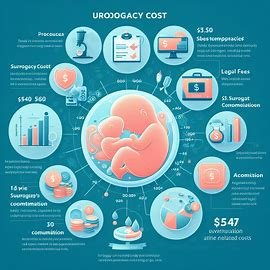Gynecological Problems and Disorders: Causes, Symptoms, and Prevention
- 2023-10-05
- Gynecological Problems, Gynecological Disorder, Common Gynecological Problems, Endometriosis
Women's health is a vital aspect of overall well-being, and gynecological problems and disorders can significantly impact a woman's life. These issues encompass a wide range of conditions that affect the reproductive system, including the uterus, ovaries, fallopian tubes, cervix, and vagina. In this comprehensive guide, we will delve into the world of gynecological disorders, understanding their common causes, symptoms, and when to seek medical attention. Furthermore, we will discuss a list of common gynecological problems and explore preventive measures that can help maintain gynecological health.
Table Of Content
- What Is a Gynecological Disorder?
- Common Causes of Gynecological Disorders
- When to See a Gynecologist
- List of Common Gynecological Problems
- Prevention of Gynecological Problems
- FAQ’S (Gynecological Problems and Disorders)
What Is a Gynecological Disorder?
A gynecological disorder refers to any condition or ailment that affects the female reproductive system. These disorders can manifest at any age and can vary in severity. Gynecological disorders encompass a broad spectrum of conditions, from benign issues like menstrual irregularities to more serious problems such as ovarian cancer. These disorders can cause physical discomfort, emotional distress, and may even impact a woman's fertility. To better understand gynecological disorders, it's essential to explore their causes, common symptoms, and when to seek professional medical care.
Common Causes of Gynecological Disorders
Gynecological disorders can have a multitude of causes, which may include genetic predisposition, hormonal imbalances, infections, lifestyle factors, and more. Here are some common causes associated with these disorders:
- Hormonal Imbalances: Fluctuations in hormone levels, particularly estrogen and progesterone, can lead to various gynecological disorders. Conditions like polycystic ovary syndrome (PCOS), endometriosis, and uterine fibroids can be influenced by hormonal imbalances.
- Infections: Bacterial, viral, or fungal infections can affect the reproductive organs. Common infections include yeast infections, bacterial vaginosis, and sexually transmitted infections (STIs) such as chlamydia and gonorrhea.
- Genetic Predisposition: Some gynecological disorders may have a genetic component, making individuals with a family history more susceptible. For example, a family history of ovarian cancer can increase the risk of developing the disease.
- Lifestyle Factors: Unhealthy lifestyle choices, such as smoking, excessive alcohol consumption, poor diet, and lack of physical activity, can contribute to gynecological problems. These factors can impact fertility and overall reproductive health.
- Structural Abnormalities: Congenital or acquired structural abnormalities in the reproductive organs can lead to gynecological disorders. Conditions like uterine fibroids, uterine septum, and polyps fall into this category.
- Age and Menopause: The natural aging process can bring about gynecological changes and disorders. Menopause, in particular, marks the end of a woman's reproductive years and comes with its own set of symptoms and challenges.
When to See a Gynecologist
Regular gynecological check-ups are essential for women's health. However, there are specific signs and symptoms that should prompt a visit to a gynecologist. Recognizing when to seek medical attention can help diagnose and address gynecological problems in their early stages, potentially improving outcomes. Here are some indications of when to see a gynecologist:
- Menstrual Irregularities: If you experience heavy bleeding, irregular periods, or severe menstrual cramps, it's crucial to consult a gynecologist. These symptoms could be indicative of conditions like PCOS, endometriosis, or uterine fibroids.
- Painful Intercourse: Pain or discomfort during sexual intercourse should not be ignored. It may be a sign of an underlying gynecological issue, such as vaginal dryness, infections, or endometriosis.
- Abnormal Vaginal Discharge: Unusual vaginal discharge that is foul-smelling, bloody, or accompanied by itching and burning may signify an infection or other gynecological problem.
- Pelvic Pain: Persistent pelvic pain that doesn't subside with over-the-counter pain relief warrants a visit to the gynecologist. This pain may be associated with conditions like endometriosis, ovarian cysts, or pelvic inflammatory disease (PID).
- Changes in Breast Health: Any new breast lumps, changes in breast appearance, or nipple discharge should be evaluated by a healthcare professional, as these can be symptoms of breast cancer or benign breast conditions.
- Sexually Transmitted Infections (STIs): If you engage in sexual activity and suspect you may have been exposed to an STI or experience symptoms such as unusual genital sores, discharge, or pain, seek immediate medical attention.
- Pregnancy and Fertility Concerns: If you are trying to conceive and have been unsuccessful for an extended period or have experienced multiple miscarriages, it's advisable to consult a gynecologist or fertility specialist.
- Menopausal Symptoms: Women experiencing menopausal symptoms like hot flashes, night sweats, mood swings, and vaginal dryness should seek guidance on managing these changes.
- Family History: If you have a family history of gynecological cancers, such as ovarian or breast cancer, or genetic conditions like BRCA mutations, discussing your risk and screening options with a healthcare provider is crucial.
- General Check-ups: Regular gynecological check-ups, including Pap smears and breast examinations, are recommended based on age and risk factors. Consult your healthcare provider for guidance on screening and preventive care.
List of Common Gynecological Problems
Gynecological disorders encompass a wide range of conditions. Here is a list of some common gynecological problems, along with a brief overview of each:
- Polycystic Ovary Syndrome (PCOS): PCOS is a hormonal disorder characterized by the development of cysts on the ovaries, irregular periods, and hormonal imbalances. It can lead to fertility issues and other health concerns, such as diabetes and cardiovascular problems.
- Endometriosis: Endometriosis occurs when tissue similar to the uterine lining grows outside the uterus. This condition can cause pelvic pain, painful menstruation, and fertility problems.
- Uterine Fibroids: Uterine fibroids are noncancerous growths of the uterine muscle that can lead to heavy menstrual bleeding, pelvic pain, and pressure on the bladder or rectum.
- Pelvic Inflammatory Disease (PID): PID is an infection of the female reproductive organs, often caused by sexually transmitted bacteria. It can lead to chronic pelvic pain, infertility, and ectopic pregnancy if left untreated.
- Ovarian Cysts: Ovarian cysts are fluid-filled sacs that can form on or within the ovaries. Most are benign, but some may cause pain or complications if they rupture or twist.
- Vaginal Infections: Yeast infections and bacterial vaginosis are common vaginal infections that can cause discomfort, itching, and unusual discharge.
- Cervical Dysplasia: Cervical dysplasia refers to abnormal changes in the cells of the cervix, often detected through Pap smears. It can progress to cervical cancer if not monitored and treated.
- Menstrual Disorders: Menstrual disorders include heavy bleeding (menorrhagia), painful periods (dysmenorrhea), and absent or irregular menstruation. These issues can be caused by various underlying conditions.
- Urinary Incontinence: Urinary incontinence is the involuntary leakage of urine, which can occur with activities such as laughing, coughing, or sneezing. It is frequently linked to the weakening of pelvic floor muscles.
- Breast Conditions: Breast conditions like fibrocystic breasts, breast lumps, and mastitis can cause breast pain and discomfort. Regular breast self-examinations and clinical breast exams are essential for early detection.
- Sexual Dysfunction: Sexual dysfunction can affect a woman's ability to enjoy sexual intercourse due to factors like pain, low libido, or difficulty reaching orgasm. It can have physical, psychological, or relationship-related causes.
- Menopause Symptoms: Menopausal symptoms, including hot flashes, night sweats, mood swings, and vaginal dryness, are common during the transition to menopause.
- Gynecological Cancers: Gynecological cancers include ovarian, cervical, uterine, vulvar, and vaginal cancers. Early detection through screening and regular check-ups is crucial for better outcomes.
Prevention of Gynecological Problems
Preventing gynecological problems and disorders is an essential aspect of women's healthcare. While some factors, such as genetics, cannot be controlled, there are many preventive measures that women can take to maintain gynecological health:
- Regular Check-ups: Schedule regular gynecological check-ups, including Pap smears and breast examinations, as recommended by your healthcare provider. Early detection can significantly impact outcomes.
- Safe Sex Practices: Practice safe sex by using condoms and being in a mutually monogamous relationship. Regular screening for STIs is also essential if you are sexually active.
- Healthy Lifestyle: Maintain a healthy lifestyle by eating a balanced diet, staying physically active, managing stress, and avoiding smoking and excessive alcohol consumption. These habits can help regulate hormones and reduce the risk of gynecological disorders.
- Birth Control: Use contraception methods as needed to prevent unintended pregnancies. Consult with a healthcare provider to choose the most suitable option for your needs and health considerations.
- Pelvic Floor Exercises: Perform pelvic floor exercises (Kegel exercises) to strengthen the pelvic muscles and reduce the risk of urinary incontinence.
- Weight Management: Maintain a healthy weight, as obesity can increase the risk of gynecological disorders such as PCOS and uterine fibroids.
- Fertility Awareness: Understand your menstrual cycle and fertility window if you are planning to conceive. Seek medical advice if you encounter fertility challenges.
- Vaccinations: Consider vaccinations that can protect against certain gynecological cancers, such as the HPV vaccine, which prevents cervical cancer.
- Stress Management: Practice stress-reduction techniques such as meditation, yoga, and mindfulness to support overall well-being and hormonal balance.
- Educate Yourself: Stay informed about gynecological health by seeking reliable information from healthcare providers, reputable sources, and educational materials. Knowledge is an effective preventative measure.
Gynecological problems and disorders are common health concerns that affect women of all ages. While some of these conditions are benign and manageable, others can have serious implications for a woman's health and fertility. Understanding the common causes, symptoms, and when to seek medical attention is essential for early detection and effective treatment.
Preventive measures, including regular check-ups, safe sex practices, a healthy lifestyle, and stress management, play a crucial role in maintaining gynecological health. By prioritizing their well-being and seeking appropriate medical care, women can take proactive steps to protect and enhance their reproductive health throughout their lives. Remember that every woman's experience with gynecological health is unique, so it's important to consult with a healthcare provider for personalized guidance and care.
FAQ’S (Gynecological Problems and Disorders)
Q. What are gynecological problems and disorders?
A. Gynecological problems and disorders are medical conditions that affect the female reproductive system, including the uterus, ovaries, fallopian tubes, cervix, and vagina.
Q. What are the symptoms of gynecological disorders?
A. Symptoms vary depending on the condition but may include pelvic pain, abnormal vaginal bleeding, vaginal discharge, painful intercourse, changes in urinary or bowel habits, breast changes, and menstrual irregularities.
Q. What are some common gynecological problems?
A. Common gynecological problems include PCOS, endometriosis, uterine fibroids, ovarian cysts, PID, cervical dysplasia, menorrhagia, vaginitis, vulvodynia, and various breast health concerns.
Q. How can I prevent gynecological problems?
A. Prevention strategies include regular check-ups, safe sex practices, healthy lifestyle choices (diet, exercise, no smoking), maintaining hormonal balance, getting HPV vaccinations, stress management, genetic counseling/testing, and breast self-exams.
Q. Can gynecological disorders affect fertility?
A. Yes, some gynecological disorders, such as PCOS, endometriosis, and uterine fibroids, can affect fertility by disrupting ovulation, causing structural abnormalities, or impacting the reproductive organs.
Q. Can gynecological disorders be hereditary?
A. Yes, some gynecological disorders, such as certain types of ovarian cancer and breast cancer, can have a hereditary component. A family history of these conditions may increase your risk, warranting genetic counseling and testing.
Q. What are the treatment options for gynecological disorders?
A. Treatment options vary depending on the specific disorder but may include medication, surgery, lifestyle changes, hormonal therapy, and pain management techniques.
Best Gynecologist Doctor in Delhi
gynecologist in rohini
gynecologist in janakpuri
gynecologist in vasant kunj
gynecologist in mayur vihar
gynecologist in patel nagar
gynecologist in saket
gynecologist in sarita vihar
gynecologist in karol bagh
gynecologist in lajpat nagar
gynecologist in paschim vihar
gynecologist in pitampura
gynecologist in rajouri garden
gynecologist in dwarka sector 12
gynecologist in palam vihar
gynecologist in vikaspuri
gynecologist in greater kailash
gynecologist in gtb nagar
gynecologist in patparganj
gynecologist in adarsh nagar
endometriosis treatment in delhi
gynecologist in dwarka sector 7
gynecologist in mehrauli
gynecologist in moti nagar
gynecologist in palam
gynecologist in west patel nagar
gynecologist in dwarka sector 6
female infertility treatment in delhi
gynecologist in dwarka sector 22
gynecologist in dwarka sector 4








Doctor team is very nice and cooperative thanks
2023-01-27 00:00:00